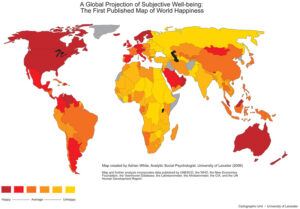The pursuit of happiness

Happiness is the meaning and purpose of life, the whole aim and end of human existence. — Aristotle
Happiness. It’s easy to think that it’s a universal emotion. But is it? In reality, cross-cultural research suggests the opposite. The relationship between different cultures and happiness is far from simple and can vary enormously from country to country
In fact, happiness is not necessarily desirable in some parts of the world. For example, in Chinese culture, funerals are a happy occasion, and preparing for them can generate enthusiasm that would be hard to understand in the West. In this culture, people go to great lengths to prepare for their funeral, choose the clothes they’ll wear, find matching shoes and jewellery, plan the meals that will be served, etc. From a Western point of view, it would be easy to think they’re preparing for a wedding instead!

This example from China is just one of many that show how happiness is interpreted and experienced in different cultures. In this article, NMTBP examines the fascinating concept of happiness from a cross-cultural point of view. Learning more about happiness in different cultures can help us better understand our own pursuit of contentment
As we delve deeper into the understanding of happiness across cultures, we uncover a rich tapestry of diverse interpretations. This complexity is not a barrier, but a fascinating puzzle that draws us in, challenging us to find common ground between different cultures and their well-being and joy
This subject has been a focus of research for decades, and the journey is far from over. Surveys like Pew’s Ladder of Life and The World Values Survey continue to measure life satisfaction and well-being at a global level. The United Nations’ World Happiness Report year after year ranks countries according to their happiness levels and strives to understand what makes people happy. This ongoing research keeps us informed and up-to-date on the global landscape of happiness. These surveys and reports offer interesting insights into the ‘ingredients’ of happiness across cultures. While it’s important to remember that there’s no standard recipe, the findings suggest at least two ways of understanding and experiencing well-being and happiness: the Western and the Eastern ways
Western Perspectives on Happiness
In Western cultures, particularly in the United States and Western Europe, happiness is often associated with individual achievement and personal fulfilment. This view is deeply rooted in the Enlightenment ideals of individualism and the pursuit of personal goals. Happiness in this context is frequently measured by individual success, material wealth, and self-actualisation
The American Dream epitomises this perspective, emphasising the importance of hard work, ambition, and attaining one’s desires. Psychological theories such as Maslow’s Hierarchy of Needs align with this view, suggesting that self-actualisation, the fulfilment of one’s potential, is the pinnacle of happiness
Eastern Perspectives on Happiness
In contrast, Eastern cultures, particularly those influenced by Confucianism, Buddhism, and Taoism, often emphasise harmony, balance, and collectivism. Happiness is seen as a collective experience rather than an individual pursuit. In many East Asian societies, the well-being of the community and family is paramount, and personal happiness is closely tied to fulfilling one’s roles and responsibilities within these groups
Buddhism, for instance, teaches that happiness comes from inner peace and the cessation of desires. This perspective suggests that true happiness is achieved not through external achievements but through internal harmony and accepting life’s impermanence. Similarly, Confucianism stresses the importance of social harmony, moral conduct, and fulfilling one’s duties to family and society as the path to a fulfilling life
The role of religion
Religion significantly influences the concept of happiness in various cultures. In predominantly Christian cultures, happiness is often linked to spiritual fulfilment and living according to divine principles. The idea of “blessedness” in Christianity suggests that true happiness is found in a close relationship with God and living a life of virtue
In Hinduism, happiness is associated with the fulfilment of dharma (duty), artha (prosperity), kama (pleasure), and moksha (liberation). This holistic approach integrates life’s material, ethical, and spiritual aspects, suggesting that happiness arises from a balanced and purposeful life
Socioeconomic Influences
Economic conditions also play a crucial role in shaping cultural perceptions of happiness. In affluent societies, where basic needs are easily met, happiness is often pursued through personal development, leisure activities, and consumerism. In contrast, in developing countries or less affluent societies, happiness may be more closely linked to economic stability, social support, and access to necessities
The World Happiness Report, which ranks countries based on income, social support, life expectancy, freedom, generosity, and corruption, highlights these variations. Nordic countries consistently rank high in happiness, emphasising social equality, welfare systems, and a strong sense of community as key contributors to their citizens’ well-being
What makes people happy: the pursuit of joy
The factors contributing to happiness in different cultures are not the only things that vary since people’s attitudes towards happiness also differ. For most of us, pursuing happiness is a given (even enshrined in the Declaration of Independence!), and we may change our lives as part of that pursuit. But happiness is not universally pursued in such an active way
For example, people in Eastern cultures like China, Japan, and Taiwan don’t strive for happiness. They may oppose the idea because they believe they’ll face misfortune if they do so. This is linked to cultural beliefs, like the idea that opposites go hand in hand or that having too much of a good thing will be punished
In other cultures, happiness is associated with luck or chance, so people may see no reason to pursue it as a goal actively. This is the case in Russia, Germany, France and Norway, where perceptions differ from the US concept of happiness, where it’s seen as a human right worth pursuing. In other cases, pursuing individual happiness may cause conflict with different values, like preserving social harmony so it’s less critical to chase it
so it’s less critical to chase it
Cultural Expressions of Happiness
Different cultures also express happiness in unique ways. In some cultures, expressing happiness openly is encouraged, while modesty and restraint are valued in others. For example, Americans may openly celebrate personal achievements and express joy exuberantly, whereas in Japanese culture, displaying too much happiness can be seen as inconsiderate of others’ feelings
Language also reflects these differences. For instance, the Danish word “hygge” captures a sense of cosiness and contentment derived from simple pleasures and togetherness. At the same time, the Japanese term “ikigai” refers to the joy and purpose found in life’s daily activities
Cultural variations in the pursuit of happiness underscore the complexity of this universal aspiration. While the desire for happiness is innate, the paths and definitions of happiness are diverse, reflecting the rich tapestry of human experience across different societies. Understanding these cultural differences can foster greater empathy and appreciation for how people worldwide seek and achieve happiness
Leave a reply
You must be logged in to post a comment.







